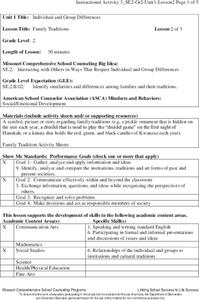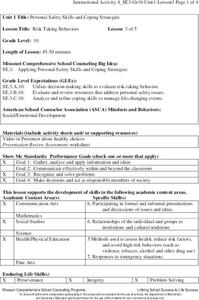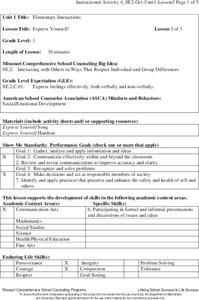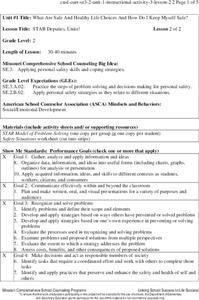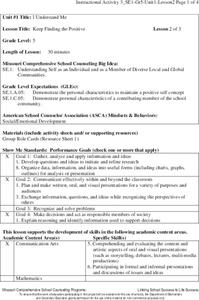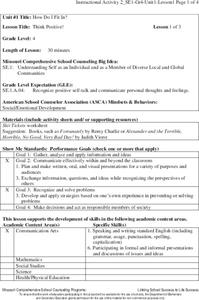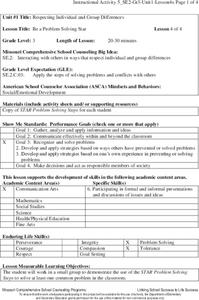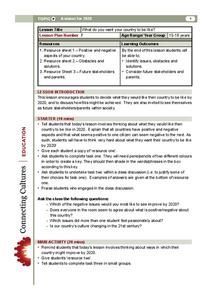Carolina K-12
Exploring the Electoral College
Does your vote really count? This activity helps young voters learn about the electoral college through a TED talk, a helpful handout, discussion prompts, and then a role-playing activity that has participants simulating an election on a...
John F. Kennedy Presidential Library & Museum
Analyzing the Inaugural Address
Get high school historians to step outside their own shoes by responding to JFK's inaugural address from the perspective of a civil rights activist, a soviet diplomat, or a Cuban exile. After a class discussion about the address, the...
Missouri Department of Elementary
How Families Change
Changes in the family such as a new baby, divorce, a new job, or death are the focus of a lesson that examines how every family is different. Scholars draw a picture of their family then share the changes that have occurred within it....
Missouri Department of Elementary
Conflict Mediation – Part 2: Practice
A lesson challenges scholars to prove their understanding of conflict mediation. Small groups role-play scenarios using two mediators and two disputants. Peers observe then discuss their findings. A worksheet outlines groups'...
Missouri Department of Elementary
Family Traditions
Honor family traditions with a instructional activity that examines the variety of winter celebrations. Class members discuss their family's traditions then complete a cut-and-paste practice page in which they match a picture to the name...
Missouri Department of Elementary
What Is Comfortable and Uncomfortable Touch?
Two stuffed animals open a activity that examines two types of touch. Scholars discuss the difference between comfortable and uncomfortable touch. They offer examples then brainstorm ways an individual can keep safe from uncomfortable...
Missouri Department of Elementary
Risk Taking Behaviors
Sophomores can be sometimes wise and sometimes foolish. The same can be said for their behaviors. After watching a presentation about risk taking behaviors, class members discuss the presentation in small groups, and then complete a...
Missouri Department of Elementary
What Color is Your Apple?
Build your classroom community with an activity that uses apples to examine oneself and their classmates. Participants draw four large apples on blank paper then exchange them within a small group. Group members write a character trait...
Perkins School for the Blind
Hat Game
Sometimes the simplest ideas foster a lot of different skills. To boost social skills, group participation, identifying others by name, and dressing skills, learners play the hat game. They take turns wearing a hat while singing a song...
Missouri Department of Elementary
Express Yourself!
Encourage scholars to express themselves with help from an engaging song. Sung to the tune of "London Bridge is Falling Down," participants sing phrases that offer tips for dealing with emotions—sad, happy, worried, proud, mad, and...
Missouri Department of Elementary
STAR Deputies, Unite!
STAR deputies unite! Scholars gather in small groups to solve problems using the STAR method. Pupils read a card that describes a situation that requires problem-solving. They role-play the scenario in front of their peers.
Perkins School for the Blind
Circle Time
Oftentimes children or teens with one or more disability are reluctant to participate in whole-group activities. Foster good participation, verbal expression, and social skills through daily circle time activities. Each day you and your...
Missouri Department of Elementary
Keep Finding the Positive
Group members take on roles to create a positive classroom community. Learners perform their role—leader, recorder, presenter, timekeeper, encourager, and collector—in preparation for a formal presentation of their positive thinking...
Missouri Department of Elementary
Communicating with I-Messages (2/2)
Class members read a handout to learn about using I-Messages—honest statements that begin with I to get their points of view across. Next, learners practice using I-Messages with partners to better communicate without hurting others'...
Health Smart Virginia
Conflict Resolution
A lesson introduces the Peace Corner—a safe place to communicate feelings and problem solve. To gain practice, scholars role-play scenarios that require conflict resolution. Peers speak, listen, brainstorm solutions, shake hands, then...
Missouri Department of Elementary
Think Positive!
Following an attention-grabbing read-aloud, scholars brainstorm ways they can change negative thoughts into positive thoughts. Small groups plan and perform a skit that showcases one of the new ideas to uplift one's feelings....
Missouri Department of Elementary
Acting Out Respect
Bert and Ernie, Lucy and Ethel ... what makes a great friend? Pupils first learn about the STAR method of problem solving: Stop, Think, Act, Review. Small groups then role play various scenarios to demonstrate respect and compromise in...
Missouri Department of Elementary
The Problem Solving Game
Creativity, communication, cooperation. Pupils assume the role of employees at a game factory working together to develop a new game. Using the principles of the STAR method (Stop, Think, Act, Review), they work in teams to create game...
Missouri Department of Elementary
Be a Problem Solving Star
Reach for the STARs! Using the resource, scholars review the STAR (Stop, Think, Act, Review) method and discuss how to use it to solve a math equation. Next, small groups collaborate to solve a common problem in the classroom using the...
Nemours KidsHealth
Bullying: Grades 6-8
Two lessons promote social awareness and build relationship skills. In lesson plan one, scholars define bullying and role-play coping strategies. Lesson two challenges learners to diffuse a bullying situation using their knowledge of...
Perkins School for the Blind
Personal Information
"Hi, how are you? My name is___." Seems simple enough but it's not always that easy to recall and relate factual information about yourself. Learners with multiple disabilities practice memorizing and relaying personal information about...
Creative Learning Exchange
The Infection Game: The Shape of Change
Encourage the spread of knowledge in your class with this cross-curricular epidemic simulation. Pulling together science, social studies, and math, this lesson engages students in modeling the spread of infectious diseases, collecting...
University of the Desert
What Do You Want Your Country to be Like?
How would you like your country to be by 2020? What issues do you feel are most important, and how do those compare with your peers? Learners tackle questions regarding the evolving national and global culture of the twenty-first century...
Missouri Department of Elementary
Talk it Over and Work It Out: Compromise!
Stop, Think, Act, Review! Scholars use the STAR method to role play two conflict resolution scenarios about childhood problems such as jealousy or cheating. Then, the larger group judges each case to determine if the compromise is a...
Other popular searches
- Social Skills Lesson Plans
- Autism Social Skills
- Personal Space Social Skills
- Social Skills for Teens
- Current Events Social Skills
- Social Skills Adolescents
- Social Skills Lessons
- Social Skills Games
- Team Building Social Skills
- Circle Time Social Skills
- Teaching Social Skills
- Cooperation Social Skills






